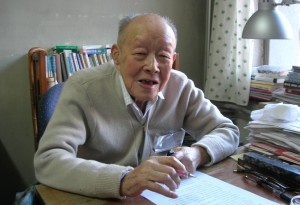Linguist, paleographer and economist Zhou Youguang, who is the inventor of pinyin - the medium that made it possible for you to type Chinese characters - turns 109 today, Xinhua reports. The only explanation Zhou could provide for his longevity was: “God forgot about me.”
Born in Changzhou, Zhou studied in Japan and worked as an economist in New York City before returning to Shanghai when the People’s Republic was established. In 1955, the Communist Party placed Zhou at the head of a linguistic reform committee to increase literacy. Zhou’s committee was charged with developing a romanization to represent the pronunciation of Chinese characters. Pinyin was made the official romanization in 1958.
Since turning 100, Zhou has published ten books, some of which are banned in China as he is now a critic of the government. As recently as October 2011, he gave an interview to NPR in which he lamented the slowness of political progress in China.
For his birthday, friends and disciples spoke to Xinhua to explain the importance of Zhou’s work and its influence on their own.
Zhang Sengen of the Chinese Academy of Social Sciences told the news portal: “Zhou career broadly falls into three stages. There is his early life in which he worked abroad while giving support to the War of Resistance against Japan and his subsequent return to China to serve as a professor of Economics; then he turned to Linguistics and Philology where he worked for three solid years to establish pinyin and helped with the modernization and internationalization of Chinese characters; and since he turned 85 he has mostly been a cultural and social critic who writes for the layman.
Zhang describes Zhou as a model intellectual, a free thinker and independent personality. “He doesn’t shy away from debate and isn’t afraid to be wrong,” said Zhang.
Jie Xizhang, a cultural commentator, describes Zhou as a genial personality and lively conversationalist. “Since retiring, Zhou has focused a lot on the development and fate of society. Despite being undeceived about the problems we have, he stays optimistic,” Jie told Xinhua.
Jie points out how Zhou, an internationalist, tries to downplay China’s exceptionality and sees China as just another part of the world. “Through the invention of Pinyin, Zhou has helped China become part of the world,” said Jie.


